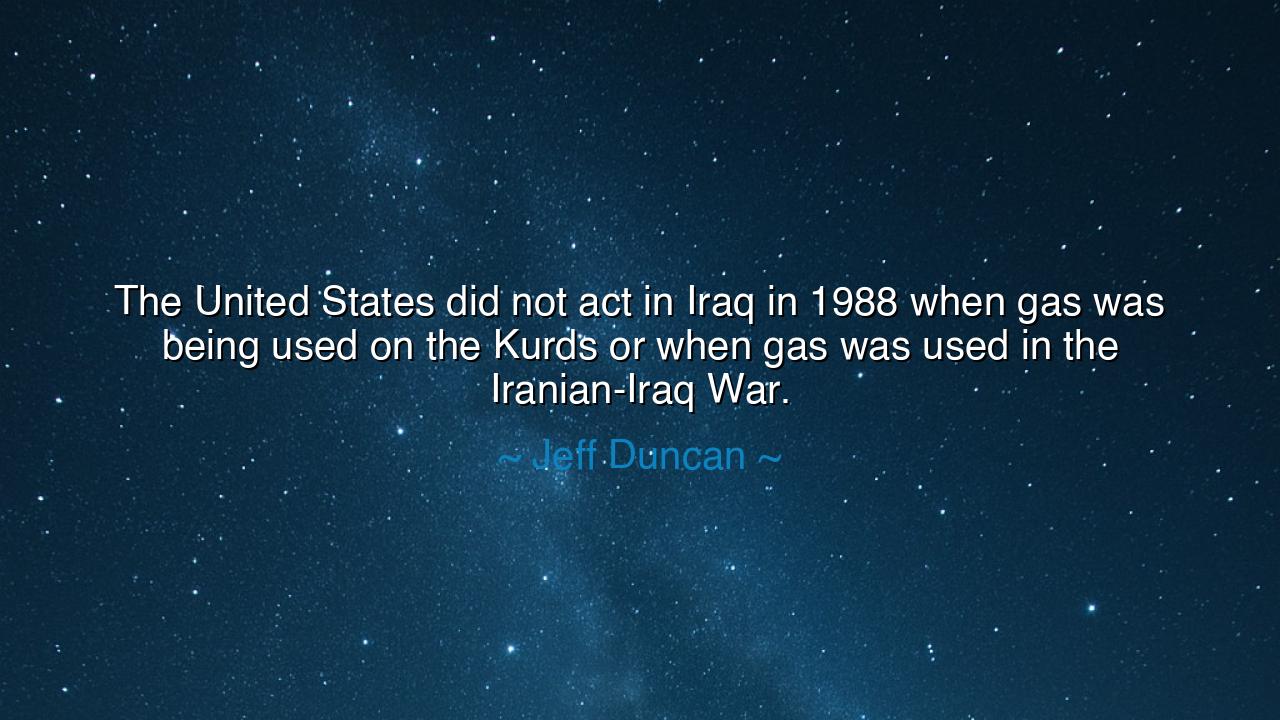
The United States did not act in Iraq in 1988 when gas was being
The United States did not act in Iraq in 1988 when gas was being used on the Kurds or when gas was used in the Iranian-Iraq War.






Hear, O children of truth and judgment, the solemn words of Jeff Duncan, who declared: “The United States did not act in Iraq in 1988 when gas was being used on the Kurds or when gas was used in the Iranian-Iraq War.” In this lament, he points to a silence that shook the conscience of the world, when crimes were committed with smoke and fire, and the guardians of justice stood still. His words remind us that in history, what is not done may weigh as heavily as what is done, and that inaction in the face of evil is itself a kind of choice.
For in 1988, the winds of death swept through the Kurdish town of Halabja. Chemical weapons rained upon innocent men, women, and children, their lungs burning, their eyes blinded, their bodies falling like leaves in winter. Thousands perished in a single day, not as soldiers but as civilians, unarmed and unprepared. And the world, though it watched, did not strike back. The crime was etched into history, yet the answer was silence.
This silence was not born in that year alone. During the long and bloody Iranian-Iraq War, both sides bled across deserts and borders, and Saddam Hussein’s armies unleashed chemical gas upon the battlefield. The world condemned in words but faltered in deeds. The great powers, entangled in rivalries and interests, closed their eyes to atrocities in the hope of maintaining balance. But such balance was purchased with blood, and its cost was measured in the lives of the innocent.
History has shown us this pattern before. In the days of Nazi Germany, before the flames of the Holocaust reached their full fury, many nations saw the signs and yet chose silence. They weighed the scales of politics and hesitation, and by the time action was taken, millions had perished. In Duncan’s warning, we hear this echo: to witness the rise of brutality and fail to act is to allow evil to gather strength. The gas in Iraq, like the camps in Europe, revealed the truth too late.
And yet, Duncan’s words are not only condemnation; they are a call to vigilance. They remind us that nations must not turn their gaze away from suffering, lest their inaction become complicity. Power carries responsibility, and silence in the presence of atrocity is itself a failure of duty. To act may be difficult, costly, and dangerous, but to refuse to act is to abandon the innocent to despair.
O children of tomorrow, take this lesson into your hearts: when you see cruelty, do not stand by in silence. When the powerful strike the powerless, do not shield your eyes. Remember that history judges not only the tyrants who wield weapons but also the bystanders who do nothing. The United States did not act in 1988, and the world still bears the weight of that failure. Let such mistakes not be repeated.
So remember Jeff Duncan’s warning: evil thrives when the righteous remain still. If you would build a just world, prepare your heart to act, even when the cost is high. For in every age, there will be Halabjas and forgotten wars, and the choice will return again: to remain silent, or to rise. Choose to rise—for silence is the ally of tyranny, but action is the voice of justice.






TQThang Quang
There’s a tragic irony here: by failing to act against chemical attacks in the 1980s, the world arguably laid the groundwork for later conflicts justified in the name of 'weapons of mass destruction.' This historical inconsistency undermines trust in humanitarian interventions. How can nations claim to defend moral order when their own past decisions reveal selective blindness? I’d appreciate a discussion on how acknowledging these omissions might strengthen ethical policymaking today.
TLThuy Linh
This reflection makes me think about moral hindsight. It’s easy to condemn inaction decades later, but what were policymakers weighing at the time—containment of Iran, Cold War dynamics, oil stability? Still, those justifications feel hollow when measured against the horror inflicted on civilians. I’m curious whether realpolitik can ever coexist with moral clarity, or if power politics inevitably leads to tolerating atrocities for the sake of perceived balance.
SNSon Nguyen
It’s hard not to feel frustrated reading this. The statement reminds us that atrocities often go unpunished when the perpetrators are politically useful. Chemical warfare wasn’t new in 1988, but the world’s muted reaction made it seem permissible. Did this inaction embolden future violations? I’d like to explore how the credibility of global institutions erodes when selective outrage replaces consistent accountability, and whether we’ve truly learned from that failure since.
HTNguyen Kieu Hue Tam
This quote exposes a haunting double standard—how human rights rhetoric often bends to geopolitical expediency. The Kurds’ suffering was undeniable, yet it drew little action because the aggressor served short-term Western interests at the time. It raises uncomfortable questions: do nations ever act purely on humanitarian grounds, or are moral values always filtered through strategic calculation? I’d like a perspective on how international law can function when enforcement depends on interest, not justice.
YHThuan Yen Ha
As a reader, this statement forces me to confront the moral selectivity of foreign policy. The use of chemical weapons against civilians and soldiers alike should have demanded an international response, yet politics and alliances seemed to outweigh principle. I wonder: when superpowers ignore atrocities for strategic convenience, do they forfeit moral authority later? This quote compels reflection on whether silence in the face of crimes becomes a form of complicity itself.